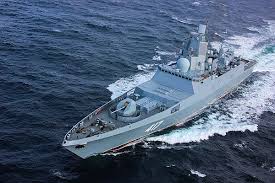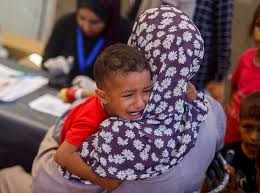F.P. Report
BRUSSELS: The European Union presented on Thursday a strategy to expand its influence in the Indo-Pacific region.
President Ursula von der Leyen said: “The economic, demographic, and political weight of the Indo-Pacific region is expanding, from the east coast of Africa to the Pacific island states. With today’s proposals, and guided by our values, we are offering a strengthened partnership to advance trade, investment and connectivity, while addressing common global challenges and reinforcing the rules-based international order.”
“The Indo-Pacific region is becoming increasingly important for the European Union. The growing economic, political and demographic weight of the region makes it a key area for shaping the international world order and responding to global challenges,” Borrell said. partner for the countries of the region. The EU and the Indo-Pacific region account for about 70% of world trade and 60% of world capital flows, “Borrell said.
“There are many challenges to international stability and order in this reg-ion, the competition betwe-en the leading world powers is intensifying, regional players are competing for land and sea space, and there is a lack of trust between the leading regional powers,” the head of European diplomacy said.
He highlighted seven main priority areas for EU action in the region: promoting sustainable and inclusive prosperity, ensuring a green transition, improving ocean resource management, digital cooperation, infrastructure development, defense and security, and improving individual human security.
Responding to comments from European media that the strategy is being developed to counter China’s growing influence in the region, Borrell said the European Union “seeks cooperation, not containment or opposition.”
The implementation of the EU Strategy will include in particular the following actions:
Completing European Union trade negotiations with Australia, Indonesia and New Zealand; resuming trade negotiations and starting investment negotiations with India; completing an Economic Partnership Agreement with the East Africa Community; assessing the possible resumption of trade negotiations with Malaysia, the Philippines and Thailand, and the eventual negotiation of a region-to-region trade agreement with ASEAN.
Concluding Partnership and Cooperation Agreem-ents (PCA) with Malaysia and Thailand; starting PCA negotiations with the Maldives, and bringing the EU’s upcoming new Partn-ership Agreement with the African, Caribbean, and Pacific States (ACP) to full fruition.
Concluding Green Alliances and Partnerships with willing and ambitious Indo-Pacific partners to fight against climate change and environmental degradation. The first has been agreed with Japan in May 2021.
Strengthening ocean governance in the region, including increasing the European Union’s support for Indo-Pacific countries’ fisheries management and control systems, the fight against Illegal, unreported and unregulated fishing and the implementation of Sustainable Fisheries Partnership Agreements.
Expanding the network of digital partnerships with Indo-Pacific partners, as well as exploring the possibility of new Digital Partnership Agreements with Japan, the Republic of Korea and Singapore.
Stepping up implementation of the Connectivity Partnerships with Japan and India; supporting partners in establishing an appropriate regulatory environment and facilitating the mobilisation of the necessary funding to improve connectivity on the ground between Europe and the Indo-Pacific.
Strengthening cooperation on research and innovation under ‘Horizon Europe’; explore the association to this programme of eligible likeminded Indo-Pacific partners such as Australia, Japan, Republic of Korea, New Zealand and Singapore.
Exploring ways to ensure enhanced naval dep-loyments by EU Member States to help protect the sea lines of communication and freedom of navigation in the Indo-Pacific while boosting Indo-Pacific partners’ capacity to ensure maritime security.
Reinforcing support to healthcare systems and pandemic preparedness for the least-developed countries in the Indo-Pacific region, enhancing collaborative research on communicable diseases in the context of the Horizon Europe research programme.
The adoption of the Joint Communication follows Council Conclusions on an EU Strategy for cooperation in the Indo-Pacific adopted on 19 April 2021.
The European Union will deepen its engagement with partners in the Indo-Pacific to respond to emerging dynamics that are affecting regional stability. We wish to promote multilateral cooperation, including with ASEAN, working on global challenges, from the COVID-19 pandemic to climate, from ocean governance to digital.
The European Union’s engagement with the Indo-Pacific region will be principled and long-term, promoting inclusive and effective multilateral cooperation grou-nded in a rules-based international order, shared values and principles, including a commitment to resp-ecting democracy, human rights and the rule of law.






